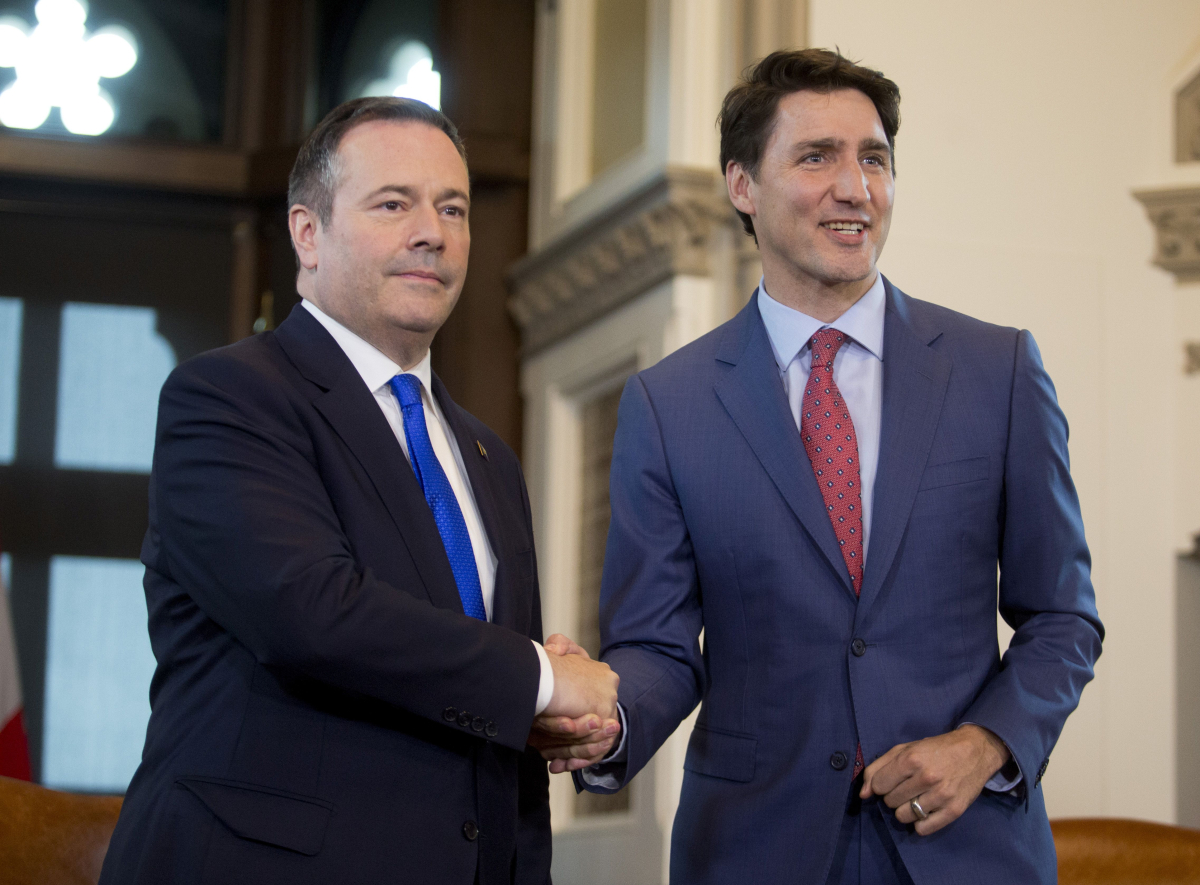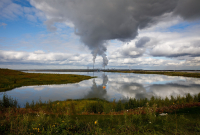Support strong Canadian climate journalism for 2025
Postmedia has hired a lobbying firm with close ties to Alberta Premier Jason Kenney in order to participate in the United Conservative Party government's new $30 million public relations "war room" in support of oil and gas companies.
Nick Koolsbergen, previously Kenney's chief of staff and campaign director in the UCP's winning 2019 campaign, founded the new lobbying firm, Wellington Advocacy in early May, a few weeks after the Alberta election. Not long after, he filed a report with the Alberta Lobbyists Registry, indicating his firm was hired "to discuss ways Postmedia could be involved in the government's energy war room."
A spokeswoman for Postmedia, which operates Canada's largest chain of newspapers, said on Friday that the lobbying was related to a commercial division of the media company, separate from its editorial staff. This commercial division produces advertising content that appears in its publications in what is known as advertorials — ads that resemble news articles and other editorial content.
"Postmedia has engaged Wellington Advocacy with respect to the commercial content area of the business and the previously announced Alberta government's energy war room," said the Postmedia spokeswoman, Phyllise Gelfand.
Can the public tell the difference between news and ads?
Kenney promised during the campaign to spend $30 million in taxpayer money to build what he described as a “fully staffed rapid response war room.” The proposed war room would help Alberta’s oil and gas industry counter what Kenney called lies from the “green left.”
Kenney has repeatedly said U.S. money is behind a campaign of climate activism aimed at sabotaging Alberta’s fossil-fuel-based energy sector by halting pipelines and land-locking Alberta’s oil.
Alberta is home to the world's third largest reserves of crude oil, after Saudi Arabia and Venezuela. Most of these reserves are made up of bitumen, a tar-like heavy oil that is buried beneath the boreal forest in the northern part of the western Canadian province. The bitumen has a larger environmental footprint and is costlier to extract than most conventional forms of crude oil since the olsands crude is mixed with clay and requires huge amounts of energy and water in the production process.
The oilsands industry has long been the source of controversy due to evidence of its environmental impacts, growing financial liabilities, and inadequate regulatory oversight. For example, recent reporting published in National Observer and the Toronto Star has found that the industry is struggling to determine how to clean up toxic tailings ponds that are large enough to be seen from space.
The federal government also says that the oilsands are Canada's fastest growing source of greenhouse gas emissions, making the industry a key obstacle that may prevent the country from meeting its international climate change commitments.
The industry has said that new technologies are emerging, which can help it address some of its environmental challenges, but it also argues that it needs more access to markets, through an expansion of pipelines, to become more profitable.
Koolsbergen, who also served as a senior aide to former prime minister Stephen Harper in Ottawa and to former B.C. premier Christy Clark, said in the filing on the lobbying registry that his firm would use communications techniques including arranging meetings, informal communication, presentations, phone calls, social media and written communication.
"It's not unusual for there to be movement between the political space and the corporate [and] civil society space," said David Moscrop, a political theorist and postdoctoral fellow in the department of communication at the University of Ottawa, in an interview with National Observer.
"The question is … will people be able to tell the difference between what’s news coverage and what’s marketing, advertising, or an influence campaign?" asked Moscrop.
Moscrop, who recently authored a book, Too Dumb for Democracy? Why We Make Bad Political Decisions and How We Can Make Better Ones, said he believes it’s the newspaper’s responsibility to ensure advertorial content is clearly marked.

Postmedia ran CAPP advertorials
Previously, Postmedia has run paid advertisements for oil and gas industry actors, including the Canadian Association of Petroleum Producers. In 2014, the Vancouver Observer reported on a Postmedia presentation that was leaked on Twitter, which outlined a strategy to Postmedia's sponsored oil and gas industry content with CAPP's "thought leadership."
"What really drives Canada's economic engine? Energy, of course," reads the presentation. "While Albertans may be acutely aware of this fact, the rest of the country often fails to grasp the fundamental role the energy sector plays in building and sustaining economic prosperity. Postmedia and CAPP will bring energy to the forefront of our national conversation."
Online news outlet The Narwhal later uncovered at least two pieces of paid oil and gas industry content in Postmedia publications that did not include disclaimers signaling the content was advertorial.
Advertorials and infomercials are a common source of revenue for media companies, particularly as they struggle to compensate for declining advertising revenues due to competition with large online companies such as Google and Facebook.
"If you look at newspaper revenues in the country … they're just trying to get through the day against unfair competition in a declining media space," said Moscrop.
But, Moscrop added, the influence of Postmedia's potential involvement in the Alberta government's oil and gas war room is amplified by the concentration of Postmedia papers in the province. It publishes the Edmonton Journal and the Calgary Herald, Sun tabloids, and more than 30 community papers.
"The concentration of media makes it hard for people to have alternatives. It makes it difficult for the average consumer to have a chance to be exposed to news media that either doesn’t participate in this sort of thing or does but from a different perspective," said Moscrop.
Looking for best use of resources
Premier Kenney’s press secretary Christine Myatt told National Observer in an email that the government is "talking to a number of stakeholders with respect to the energy war room, and will look for the best use of resources in terms of how advertising dollars are spent."
The Alberta NDP critic for democracy and ethics, Heather Sweet, called Postmedia’s hiring of a partisan lobbyist "deeply troubling." But Sweet, who represents an Edmonton-area riding in the provincial legislature, said her party remains “confident in the unbiased impartiality of the journalists in (Postmedia's) Edmonton and Calgary newsrooms."
Koolsbergen’s lobbyist registration also indicates that Postmedia received more than $1.5 million under the Canadian Periodical Fund, a federal program designed to help Canadian publishers “overcome market disadvantages.” Last year, Ottawa announced $595 million over five years to support struggling media providers in Canada. This means Postmedia’s Content Works division could run advertorials on behalf of Kenney’s war room against environmentalists, while its news division is supported by funding distributed by the Trudeau government.







Comments
You mean, Postmedia isn't already involved in Alberta's ‘energy war room’?
What a joke. Every last one of Postmedia's pundits is already an oil industry cheerleader. Postmedia doesn't have one pro-environment, anti-fossil fuel, climate activist writer on staff.
Day after day, Postmedia's scribblers regurgitate the same talking points from CAPP, Vivian Krause, and Ethical Oil. Banging the drum for new pipelines. Attacking environmentalists and ENGOs. Trumpeting First Nation support for "development" while sidelining indigenous opposition. Ignoring climate change. Flouting IPCC warnings.
The onslaught is non-stop.
What more could Postmedia possibly do?
Make more money doing more of the same. It's a crude tool, but it's well used in this province, as you mention.....and if nothing else, it may make opposition to Kenny's vision of tomorrow feel hopeless, out numbed, and with no place to go.
Bullying works in Alberta. We have to remember that.
“Postmedia lobbies to get involved in Jason Kenney's oilpatch 'war room'.”
Advertorials and infomercials are a common source of revenue for media companies….
After years of accepting an occasional letter to the editor the North Shore News(NSN) (and Burnaby Now) stopped posting my letters…. This appeared to happen after ‘large’ TCX ads appeared in the North Shore News…I wrote to the NSN editor suggesting that was the case and was told ‘newsroom operates independently from sales department..” Yes these TCX ads were clearly ‘paid for ads’…but by excluding offsetting public comment, ‘letters’ this community paper chose to favour the advertiser, in my opinion
I suspect that “advertorials and infomercials’ will appear without clarification…
I’m tempted to call this the ‘slippery slope’ for media journalism…media already shapes our thinking …sometimes for good…and sometimes otherwise !
Carl Shalansky, P. Eng. (Retired)
Blog: https://redfern3359.wordpress.com/
(604) 986-4657
Good Grief! One set of losers now trying to parasitize another set of losers who are playing wily beguiled with the Alberta taxpayers' money.